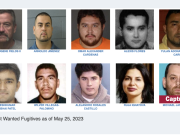Prison vs. County Prison

Arizona Donations Help Enforce Law

Over $3.6 million worth of donations have been donated to Arizona
to help increase laws to crack down on illegal immigration. Donations came from
both in state and out of state donors.
Timothy Mellon, a Wyoming resident from a well-known Pittsburgh
steel family, donated $1.5 million to a legal defense fund. Over 42,000 people
from other states have contributed to Arizona to help enforce the law.
The law, which was passed earlier this year, considers illegal
immigration a state crime and requires police to check immigration status of
those who are suspected to be in the state illegally.
Since the law was passed, a national debate was sparked and
allowed for nearly 25 other states’ representatives to claim that they would
draft similar laws if they were elected. Arizona is currently regarded as a
testing state for battling illegal immigration as well as figuring at what laws
work best.
Arizona Immigration Law Breakout: Nine College Students Arrested
Soon
after the signing of the new Arizona immigration law, Senate Bill (SB)
1070, in April 2010, protests were reporting breaking out against the
legislation, which puts new enforcement measures in the hands of state
law-enforcement authorities against illegal immigration. According to
reports issued from the Capitol as Governor Jan Brewer was affixing her
signature to the Arizona immigration law, some 1500 demonstrators had
assembled, either in support or opposition, and did not hesitate to make
their views known as the merits of a piece of legislation which has
been both championed and denounced.
The
Arizona immigration law breakout of protests led, in some cases, to
arrests, as with the disorderly conducts charges pressed against nine
people, all college students. They had affixed themselves to the state’s
old Capitol building to symbolize the oppressive detentions which they
asserted would result from the passage of the Arizona immigration law.
The Arizona immigration law breakout of protests also included public
declarations of opposition from recognized community leaders, from both
within and without Arizona, and from such various areas as activists,
political officeholders, and religious leaders. The Arizona immigration
law breakout of protests was encouraged, for one, when Los Angeles
Cardinal Roger Mahoney compared the then-proposed, now-implemented
legislation to “Russian Communist” and “German Nazi” tactics, raising
the specter of a “police state” being created by SB 1070, an assertion
hotly disputed by the law’s supporters in the legislature and throughout
the state. Clarence Dupnik, Sheriff of Pima County, also criticized the
immigration law.
AZ Immigration Law Breakout
AZ immigration law breakout
The
AZ immigration law breakout of protests, launched specifically against
the new legislation of SB (Senate Bill) 1070, began as soon as it seemed
likely that this law, in its initially proposed form, would be passed
through the legislature and then approved by Governor Jan Brewer. At the
same time, supporters of the bill were equally vociferous in defending
the law, particularly against the criticism that it would create new
opportunities for ethnic profiling on the part of the state’s law
enforcement authorities. The AZ immigration law breakout of protests has
turned on, in part, the law’s inclusion of language allowing police to
use a person’s ethnicity as a factor when making the judgment of whether
or not to stop that person. Despite criticism that this provision
amounted to discrimination against the state’s many Latino residents,
Governor Brewer signed SB 1070 on April 23, 2010, thus allowing the
legislation to go into effect on July 29 of that year.
The
AZ immigration law breakout of protests has been reported as a
grassroots-level reaction against the legislation that has been matched,
in some cases, in the halls of government power, and from other areas.
Expressing similar concerns to those which prompted the AZ immigration
law breakout, the Justice Department lobbied a legal challenge against
the legislation’s constitutionality. Some religious organizations issued
statements showing agreement with the AZ immigration law breakout of
protests, including from the U.S. Conference of Catholic Bishops and the
office of Los Angeles Cardinal Roger Mahoney, while others abstained
from comment.
First Western MA Business Partners with ICE

On November 27, 2012, Immigration and Customs Enforcement (ICE) announced that the first western Massachusetts company, Classic Site Solutions Inc, joined the ICE’s IMAGE program (Mutual Agreement between Government and Employers). Classic Site Solutions is a general contractor that specializes in green construction, restoration, and site security.
The IMAGE program provides information and training to employers to make sure the company is hiring employees authorized to work in the United States. The program includes I-9 audit training and E-verify training as well.
E-verify is an internet database used by employers around the United States. The website is run by the Department of Homeland Security (DHS) and provides links to the Social Security Administration’s database as well as DHS immigration records.
Employers in the IMAGE program must complete I-9 forms for all applicants as well. The form requires the employer to record identifying documents and make sure the documents appear genuine.
Employers in the IMAGE program are still subject to HSI investigations. The IMAGE program protects the employer against prosecution if illegal workers still managed to gain employment after E-Verify and I-9 audits. HSI specifically looks for identification fraud and trafficking, and they work with a U.S. attorney’s office to prosecute an employer if they’re knowingly employing illegal workers.
Bruce M. Foucart, the special agent in charge of ICE’s HSI in Boston, stated: “When employers make a commitment to hire and maintain a lawful workforce, it's good not only for their business, but for the community and the nation.”
Foucart stressed that HSI will continue to investigate and prosecute employers who harbor illegal workers: “HSI will continue to hold employers accountable for hiring and maintaining a legal workforce. We encourage employers to take the employment verification process seriously, as we expand the number of audits we are conducting throughout New England each year. HSI will continue to focus its attention on employers that are knowingly employing illegal workers.”
Source: Immigration and Customs Enforcement
Recent Immigration Law Changes
dilemma over the issue of
immigration law. Illegal immigrants may be guilty of violating
immigration law but not
violators of criminal immigration law must be considered when putting a plan
into action. Supposed aggressive tendencies of prosecuting Homeland Security
agents and the sympathies of Mexican, Latin and Hispanic voters were all likely
influences on immigration law changes which went into effect last year that
affected ICE operation. These immigration law changes affected the Memorandums
of Agreement as they relate to the Immigration and Naturalization Act.
Concerning tangible changes to the practices of border agents and local law
enforcement as they enforce criminal immigration law, the Obama
administration’s immigration law changes required the prosecution of criminal
immigrants under due process of law, limited actions of deportation to major
offenders of criminal law and shone a spotlight on local police organizations.
debate that all too often neatly correlates with an individual’s overall
political outlook. The 2009 revisions to the Memorandums of Agreement that
impact the way criminal immigration law is enforced may have been an attempt at
bringing border patrols closer to the middle of the spectrum. Yet opponents of
Obama and this new policy would probably insist that these immigration law
changes are too liberal. By catching and releasing criminal aliens who have
violated the law, some civil liberties may be preserved, but there is a risk
that re-releases may endanger the safety and lives of legal citizens.







